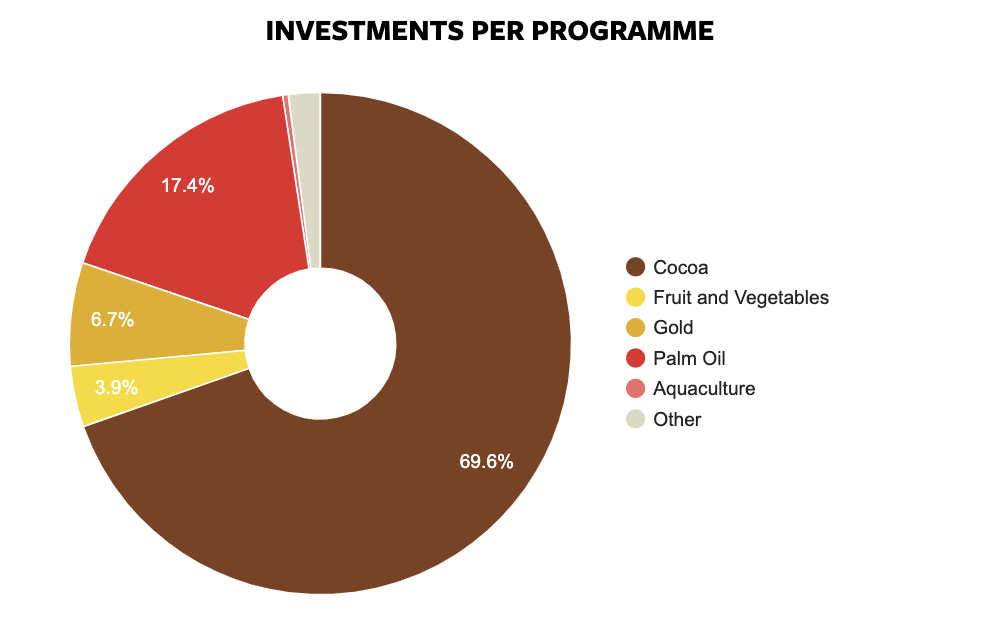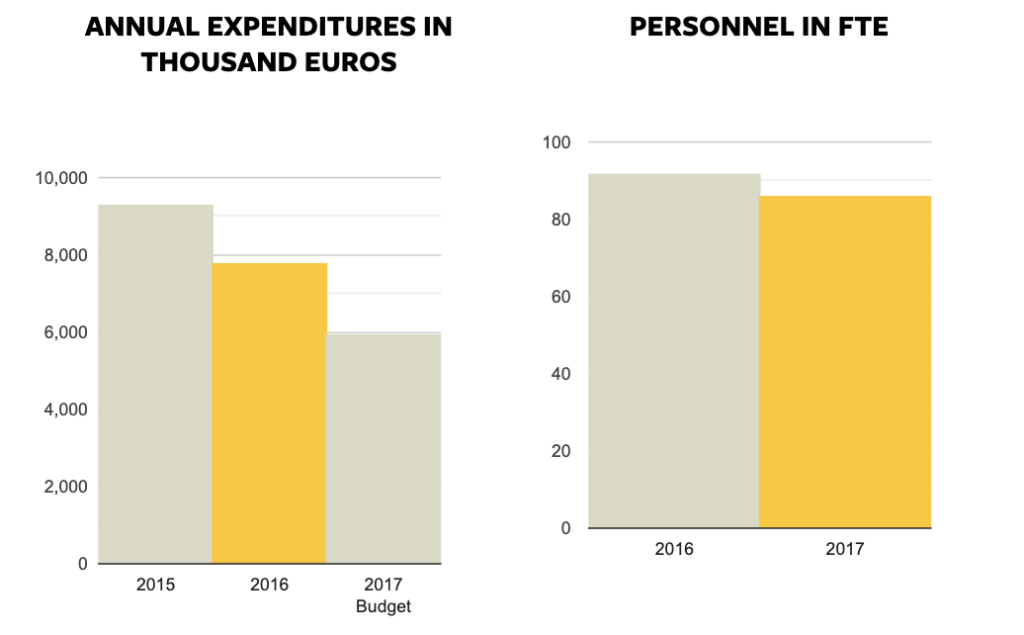Attention was given to the promotion of climate-smart agriculture and empowering women and youth through training on entrepreneurial skills and community development. Solidaridad has positioned itself as a credible partner in the policy development space. A pilot group of farmers was introduced to the use of digital technologies to learn about and adopt good agricultural and business practices through interactive voice responses using the Voto Mobile platform.

Solidaridad also works to ensure that farmers plant food crops to meet household food needs. Cocoa and palm oil farmers who are establishing new plantations are supported to integrate food crops such as cassava, maize, plantain and cocoyam to cultivate exclusively food crop farms. In 2017, Solidaridad continued to observe improved maize productivity from 2.1 kg per hectare to 4.5 kg per hectare among beneficiary farmers. This is an increase of 114%.

Interventions were focused on enhancing livelihoods in mining communities and supporting responsible small-scale mining. A government policy to ban small-scale mining in Ghana affected programme implementation. Despite this, the programme was able to sign a memorandum of understanding with 13 small-scale mines. In addition, Solidaridad formalized its partnership with the Minerals Commission of Ghana to support responsible small-scale mining and has contributed to the development of the Multilateral Mining Integrated Project of Ghana.

The palm oil programme focussed on the integration of independent smallholder farmers into the supply chain by earning certification from the Roundtable on Sustainable Palm Oil through increased capacity building. This includes technology demonstrations on best management practices, as well as group formation and its management. In Sierra Leone, Solidaridad facilitated dialogue among stakeholders on land acquisition processes for large-scale palm oil investments by the company Natural Habitat. A permanent platform for engagement is now in place.

DEVELOPMENTS
West African economic growth rates have been largely insufficient to make significant reductions in poverty. Most farmers and companies in the region produce and trade in highly localized markets and are not able to achieve sufficient economies of scale. This is essential to attract broad-based investments that could accelerate growth and ensure poverty reduction.
Throughout the year, there were significant price reductions in the global cocoa sector. While Cote d’Ivoire took a firm stance to reduce farm-gate prices of the commodity to farmers, the government of Ghana maintained farm-gate prices. The situation of cocoa price instability continues to be a source of worry for both Cote d’Ivoire and Ghana.
However, despite these challenges, there was a relatively stable political climate across the West African sub-region. Solidaridad conducted several stakeholder engagements to continue implementation of its active projects and programmes in the sectors of palm oil, cocoa and gold. Solidaridad also continued to focus on interventions to improve robust infrastructure by supporting small and medium-sized enterprises to deliver efficient and effective services, mainly in cocoa and palm oil.

ACHIEVEMENTS
The Cocoa Rehabilitation and Intensification Programme continued to support service delivery through 21 rural service centres in Ghana. A total of 95 rural service centre managers and technicians were trained and coached in entrepreneurship, business planning and management to improve service delivery to over 45,000 farmers. This resulted in an increased cocoa yield from 400 kg per hectare to 800 kg per hectare.
Solidaridad’s youth cocoa programme, MASO, engaged a total of 2,700 youth by equipping them with skills in cocoa agronomy, best management practices and entrepreneurship. A total of 40% of trained youth began their own cocoa enterprises.
Through the LEGEND project in Sierra Leone, the first palm oil multi-stakeholder platform was established for the region. This platform is well represented by different stakeholders including government, the private sector, community leaders, youth, women groups and other civil society organizations. The LEGEND project promotes transparency in land acquisition processes for large-scale land-based agricultural investments using the Free, Prior & Informed Consent Guidelines as well as the Voluntary Guidelines on the Responsible Governance of Tenure tool.
The Advocacy for Change programme in cocoa facilitated discussions on land tenure and ownership between traditional authorities and tenant farmers. With the assistance of legal experts, landowners and tenant farmers have now agreed on templates for documenting tenurial arrangements to enhance security for farmers. The engagement has led to the development of a strategic roadmap.
Solidaridad’s efforts continue to mitigate the effect of youth unemployment and positively influence national policies in the area of land use and safe farm practices.

PARTNERSHIPS
Solidaridad worked with 40 partners in 2017, both from the public and private sector. Cocoa partnerships contributed to about 58% of existing partnerships in the region. New donors in the West African region include the Swiss Development Cooperation which supports the Sustainable West Africa Palm Oil Programme. The World Bank is funding the Dedicated Grant Mechanism project. Achmea is funding the palm oil programme in Ghana. The West Africa regional office’s largest portfolio is cocoa. Its most influential partners are the Ghana Cocobod and the Conseil du Café Cacao in Cote d’Ivoire. These partners continue to support Solidaridad to address sector policies and institutional frameworks to create a vibrant, responsive and inclusive West African cocoa economy.
In addition, the Ghana Cocoa Board supports the provision of improved planting material for trained youth under Solidaridad’s “MASO” or “Next Generation Cocoa Youth Programme”. Partnerships with seven cocoa companies helped to successfully test the implementation of the Rural Service Centre concept as an institutional mechanism for addressing sustained delivery of production support services to farmers. The CocoaLife, a Mondelez project in Cote D’Ivoire, is supporting communities to develop long-term community action plans for thriving cocoa communities. The national and regional agencies for child protection in Cote d’Ivoire continued to partner with Solidaridad to implement the CocoaLife Programme through training communities on gender, child rights and child protection issues.
ORGANIZATION
A variety of full-time staff was hired during the year to boost Solidaridad West Africa’s capacity to address Solidaridad’s global innovation themes. The new expertise recruited include a Knowledge Management and Interactive Training Specialist, a Monitoring and Evaluation Specialist, a Senior Climate Specialist, an Impact Investment Manager, a Digital Solutions Manager and other project officers. Operations in Sierra Leone and Liberia have significantly increased with the commencement of the Cocoa Rehabilitation and Intensification Programme – Phase II and the Sustainable West Africa Oil Palm Programme Phase II funded by the European Union. The Sierra Leone office was fully registered and recognized as a legal entity in 2017. The total number of staff maintained in the year was 92.
Solidaridad organized a series of learning events to share findings and lessons from both the Cocoa Rehabilitation and Intensification Programme – Phase II and the Sustainable West Africa Oil Palm Programme Phase II in West Africa and Europe. A learning event was held with key stakeholders in the palm oil sector in Nigeria. The West Africa regional office participated and made presentations at the Annual Roundtable on Sustainable Palm Oil Conference in Bali.
COMMUNICATION & CAMPAIGNING
Solidaridad implemented a more coordinated and consistent approach to communication in 2017. A blend of activities was used to enhance corporate visibility and showcase Solidaridad’s expertise. A new website for the youth in the cocoa programme was created. Programme results were packaged and disseminated widely on the global, MASO or Next Generation Cocoa Youth Programme, as well as the Sustainable West Africa Palm oil Programme website.
Key events were used as platforms to profile the West Africa regional office within the region. Major events that staff participated in include the COPAL Day 2017, West Africa Agro Food Fair, the RSPO conference, Ghana REDD+ Forum, Cocoa Certification Conference and World Cocoa Conference.
Media engagements were conducted across West African countries to highlight key results of Solidaridad’s interventions and major events. In Ghana, documentaries on gold, cocoa and palm oil were shared through social media and on national television. About 60 articles were published in Ghana alone across radio, TV, newspapers and online. These were aimed at general audiences, private sector companies and public sector actors.
Solidaridad’s regional presence on Facebook grew significantly with followers increasing from 1,000 to over 10,000. This growth is a result of the creation of thematic pages, which allows for better content dissemination through existing Facebook and Twitter accounts for programmes and the creation of new pages for the Liberia Cocoa Sector Improvement Programme and the Ghana Dedicated Grant Mechanism.
FINANCE & CONTROL
Solidaridad West Africa was able to secure 68% of its annual target of 8 million euro. The budget for 2018 is expected to increase from 14 million euro to 18 million euro. This will enable Solidaridad West Africa to execute its planned activities for meeting the goals and objectives of the Multi-annual Strategic Plan – “Ambition 2020” .
